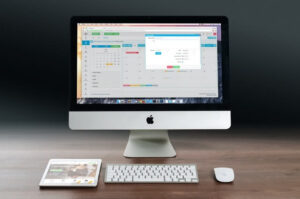
It is a clear expectation that critical data needs to be accessible 24/7/365. Without a protection strategy for that data, that simply wouldn’t be possible.
Theft
We just talked about the data needing to be accessible. When we store the data on different devices and then transport those devices – how do we ensure that said data isn’t compromised or accessed by people who shouldn’t have access to it?
If we are going to need the data to use when we are offline and away from the office, you might try using a SecureUSB. This is a flash drive that offers military grade encryption. Also, if you happen to lose it or if it gets stolen, no one will be able to access the contents because they won’t have the PIN to enter into the keypad located on the outside of the device. This is the most secure way to use a USB flash drive for those who want to protect their data.
Protecting Data
That is one way to protect your data while on the go. But, before you being trying to protect your business data, first, you will need to know the answers to the following questions:
- What operating systems are you using?
- What types of data will be backed up?
- How much data will be backed up?
Once you have found the answers to these questions, you will be better prepared to determine which protection options will be ideal for both your business and yourself.
Also Read
Other Forms of Protection
Not all data and business information will be able to be protected simply by being backed up on your system. What about protecting information such as designs and intellectual property? Here is where trademarks, copyrights, and patents come into play. These are various types of legal filings that not only document your ownership, they also create various legal protections that will assist you in protecting your business data and property. In order to get these, you will need to submit an application to your local appropriate government agency and you will need to explain why this asset is yours. Even if you happen to own copyrights before you file, you still need to make sure that these rights are totally protected.
In Case of Emergency
Did you know that after a disaster occurs, about 40 – 60% of the small businesses will never open again? The value of the data in your business is incalculable, so it is critical that you protect your employees and your business by making sure that you will be prepared for the occurrence of a man – made or natural disaster. You need to develop a plan of action in order to lessen any impact of such disasters or emergency situations and have a disaster recovery plan in place to make sure that you will be back up and running as soon as possible.
Security Suites
Safeguarding your data is more than just backing it up. Things like malware, computer viruses, and intrusion attempts can all compromise our business data while threatening your systems.
Think about installing a hardware firewall. Most of the firewall systems will offer protection for your software, but by the time they actually get activated, the threat will already be in your network. Having an appliance-based, secure firewall that is between your business data and the internet will block threats as well as intruders before they are able to get into your network.
Another layer of security could be in the form of spam filters and anti – virus programs. These will protect both outgoing and incoming data. Also, consider using content filters. These can protect your local computers from threats from malware by blocking their entry into websites that could be potentially harmful.
Protecting Data with Virtual Private Networks
It’s also important to consider how data is transferred at your local office and while employees are away from the office. While your local office ISP and internet connection can be monitored by security protocols there remains a pretty big vulnerability when employees are out of the office.
Employees using public Wi-Fi or unsafe Wi-Fi networks are suspect to having sensitive data stolen. Malicious third parties can spy on your data being sent back and forth. One of the best ways to mitigate this issue is to use a VPN. A VPN or virtual private network works be creating a secure tunnel from your computer to the network. You can think of it like your own encrypted tunnel to get from one part of the Internet to the other. It’s important to choose a VPN company that also doesn’t log your data. Websites like Privacy Australia, help customers understand which VPN companies are safe to use and don’t log customer details.
It’s important to understand that data protection starts first with education. Knowing how and where threats occur is one of the best ways to protect your business and your employees.
These are just a few suggestions for protecting your business data. What other suggestions can you come up with?